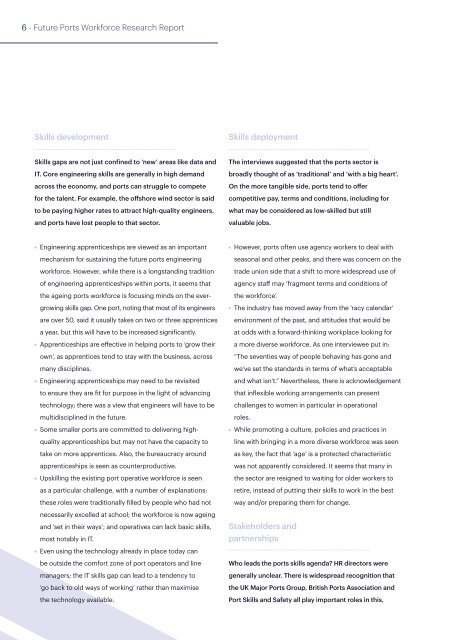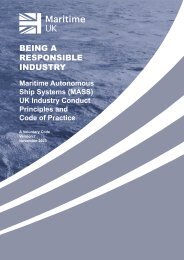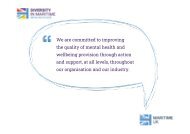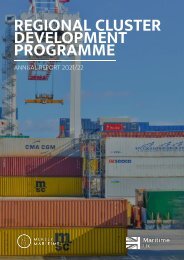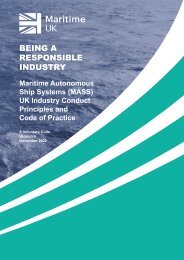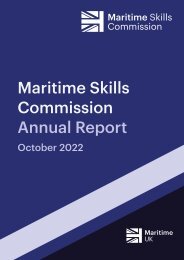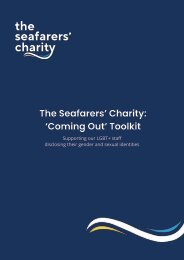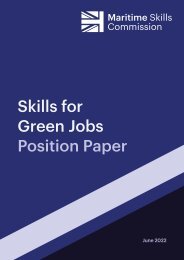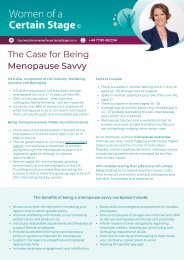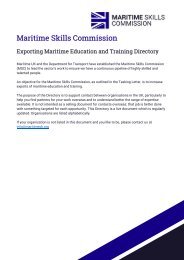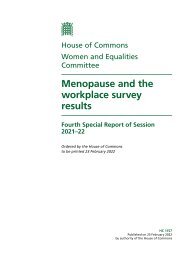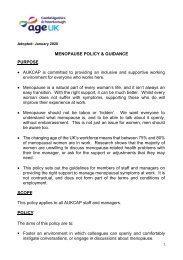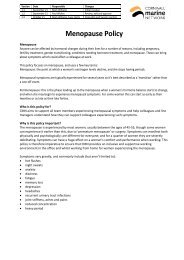Maritime Skills Commission - Future Ports Workforce Research Report - March 2022
Create successful ePaper yourself
Turn your PDF publications into a flip-book with our unique Google optimized e-Paper software.
6 - <strong>Future</strong> <strong>Ports</strong> <strong>Workforce</strong> <strong>Research</strong> <strong>Report</strong><br />
<strong>Skills</strong> development<br />
<strong>Skills</strong> gaps are not just confined to ‘new’ areas like data and<br />
IT. Core engineering skills are generally in high demand<br />
across the economy, and ports can struggle to compete<br />
for the talent. For example, the offshore wind sector is said<br />
to be paying higher rates to attract high-quality engineers,<br />
and ports have lost people to that sector.<br />
Engineering apprenticeships are viewed as an important<br />
mechanism for sustaining the future ports engineering<br />
workforce. However, while there is a longstanding tradition<br />
of engineering apprenticeships within ports, it seems that<br />
the ageing ports workforce is focusing minds on the evergrowing<br />
skills gap. One port, noting that most of its engineers<br />
are over 50, said it usually takes on two or three apprentices<br />
a year, but this will have to be increased significantly.<br />
Apprenticeships are effective in helping ports to ‘grow their<br />
own’, as apprentices tend to stay with the business, across<br />
many disciplines.<br />
Engineering apprenticeships may need to be revisited<br />
to ensure they are fit for purpose in the light of advancing<br />
technology; there was a view that engineers will have to be<br />
multidisciplined in the future.<br />
Some smaller ports are committed to delivering highquality<br />
apprenticeships but may not have the capacity to<br />
take on more apprentices. Also, the bureaucracy around<br />
apprenticeships is seen as counterproductive.<br />
Upskilling the existing port operative workforce is seen<br />
as a particular challenge, with a number of explanations:<br />
these roles were traditionally filled by people who had not<br />
necessarily excelled at school; the workforce is now ageing<br />
and ‘set in their ways’; and operatives can lack basic skills,<br />
most notably in IT.<br />
Even using the technology already in place today can<br />
be outside the comfort zone of port operators and line<br />
managers; the IT skills gap can lead to a tendency to<br />
‘go back to old ways of working’ rather than maximise<br />
the technology available.<br />
<strong>Skills</strong> deployment<br />
The interviews suggested that the ports sector is<br />
broadly thought of as ‘traditional’ and ‘with a big heart’.<br />
On the more tangible side, ports tend to offer<br />
competitive pay, terms and conditions, including for<br />
what may be considered as low-skilled but still<br />
valuable jobs.<br />
However, ports often use agency workers to deal with<br />
seasonal and other peaks, and there was concern on the<br />
trade union side that a shift to more widespread use of<br />
agency staff may ‘fragment terms and conditions of<br />
the workforce’.<br />
The industry has moved away from the ‘racy calendar’<br />
environment of the past, and attitudes that would be<br />
at odds with a forward-thinking workplace looking for<br />
a more diverse workforce. As one interviewee put in:<br />
“The seventies way of people behaving has gone and<br />
we’ve set the standards in terms of what’s acceptable<br />
and what isn’t.” Nevertheless, there is acknowledgement<br />
that inflexible working arrangements can present<br />
challenges to women in particular in operational<br />
roles.<br />
While promoting a culture, policies and practices in<br />
line with bringing in a more diverse workforce was seen<br />
as key, the fact that ‘age’ is a protected characteristic<br />
was not apparently considered. It seems that many in<br />
the sector are resigned to waiting for older workers to<br />
retire, instead of putting their skills to work in the best<br />
way and/or preparing them for change.<br />
Stakeholders and<br />
partnerships<br />
Who leads the ports skills agenda? HR directors were<br />
generally unclear. There is widespread recognition that<br />
the UK Major <strong>Ports</strong> Group, British <strong>Ports</strong> Association and<br />
Port <strong>Skills</strong> and Safety all play important roles in this,<br />
but there was a lack of clarity around their respective<br />
remits. This may partly explain an apparent disconnect<br />
between maritime-wide strategies and initiatives, and<br />
related activities at port level.<br />
Networking and sharing experiences about what works<br />
well (or does not) is seen as valuable.<br />
Not all HR Directors are ‘equal’ – some have more power<br />
and influence in their organisations than others.<br />
The view was that real change will only happen if<br />
management and senior people and the influencers are<br />
prepared to change.<br />
Covid-19 has shone a spotlight on HR activities and<br />
changed attitudes to mental health, emotional health,<br />
culture and engagement.<br />
Trade union reps were keen to highlight the value of<br />
working in partnership to effect change, but there was also<br />
evidence of tension between employers and some<br />
employee bodies. Part of this tension seems linked<br />
to uncertainty about the longer-term impact of new<br />
technologies and the potential that automation will lead<br />
to job losses.<br />
Figure 1: Anderson, P. and Warhurst, C. (2012). ‘Lost in Translation?<br />
<strong>Skills</strong> Policy and the Shift to Skill Ecosystems’, in D. Nash and<br />
T. Dolphin (eds), Complex New World: Translating New Economic<br />
Thinking into Public Policy, London: IPPR, pp. 109–120.


